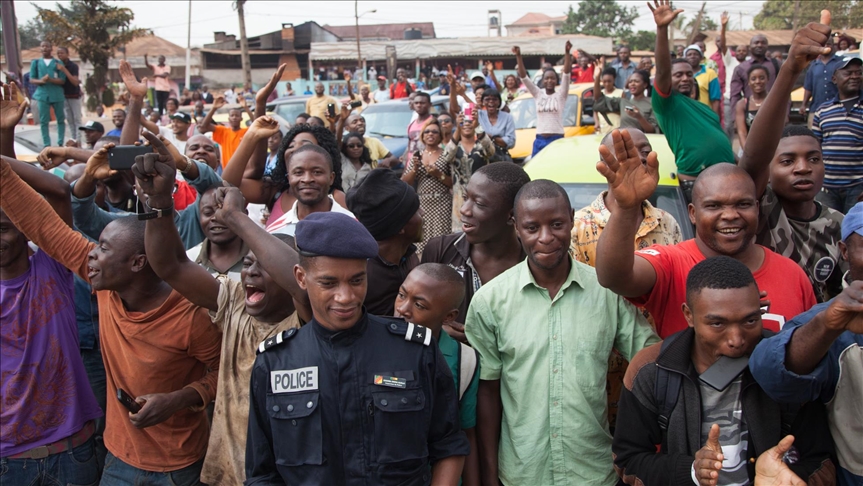Reunification threatened by disunity in Cameroon
6 decades after independence, Anglophone and Francophone Cameroonians are still in search of common ground

YAOUNDE, Cameroon
On this day 49 years ago, Cameroon's English and French speaking areas were reunited under a republic by a successful referendum.
In 1972, the federal system was abolished in Cameroon following a referendum organized by Amadou Ahidjo, the first Cameroonian head of state.
The Central African nation has since been fraught with difficulties.
"The march towards reunification was an odyssey that was not without risks. It was a path fraught with trials, delicate negotiations for our young diplomacy, and sometimes internal opposition that had to be taken into account," declared Paul Biya, Cameroon's President, in his commemorative speech in 2014.
It is customary for him to give a speech on the occasion of Unity Day marked every year on May 20.
Last year's festivities were dampened by the pandemic and measures to stem the spread of the coronavirus.
The utility of the day has been questioned since Oct. 11, 2016 when a lawyers' strike led to the Anglophone crisis.
They demanded the application of the common law, an Anglo-Saxon legal system based on jurisprudence, and not only Roman law, or written Napoleonic codes. They also demanded the rewriting the laws in English.
Clashes which followed the strike have paralyzed the English-speaking regions of the country, resulting in at least 3,000 deaths and 700,000 displaced persons, according to concordant sources. Leaders of the English-speaking population are calling for separatism and federalism because of the marginalization they say they are suffering.
Past frustrations
Several historical sources report that the feeling of marginalization hangs over 20% of the Cameroonian population which is based in the southwest and northwest regions.
Originally "at the crossroads of the British and French empires in Africa, Cameroonian reunification is simultaneously a cultural ideal" and "a political strategy, a pillar and a constraint of post-colonial nation-building," noted Melanie Torrent, a researcher, in a paper published on the issue.
However, this reunification masked “great political and cultural marginalizations,” she wrote.
Another historian, Enoh Menyomesse said the reunification also caused “enormous problems of harmonization within the administration.”
In a column published in 2016, he recounted Amadou Ahidjo's annoyance at taking exceptional measures to favor native Anglophones "harmed by reunification" and to satisfy John Ngu Foncha, the prime minister of British Cameroon, who pleaded on their behalf.
Cameroonian historian Emmanuel Tchumtchouaalso considers reunification to be “a political deception” when he recounted the colonial origins of the Anglophone crisis.
He explained that in 1972, when oil was discovered in Limbe in the Anglophone zone, the French asked Ahidjo to merge the two states so that they could control the oil.
The current conflict is between two political cultures, “a dictatorial French culture and a freer English culture. These two antipodal paradigms make it difficult for Anglophones and Francophones to be on the same page," the historian said in an interview last year.
Bilingualism
Today, the promotion of bilingualism is something the Cameroonian authorities are using in the search for a way forward.
National unity is also strongly affected by tribalism among the more than 250 ethnic groups that make up this Central African country of more than 22 million inhabitants.
Yet "Cameroon has missed a decisive turning point in its history," sociologist Tchakounte Kemayou told Anadolu Agency.
"This country has not evolved in the direction of national unity. Reunification would have allowed us to choose a national language that could be a foundation on which to build a nation. But currently, no language unites Cameroonians. The results of this reunification are mixed, not to say negative," he said.
"Unity is challenged by the fundamental element that is language. It is normal that the English-speaking zone is distinguished from other regions by the colonial language. If the policy of a common language had been adopted from the beginning and that language was taught in schools, I don't think there would be any denominations of Anglophone or Francophone regions," the sociologist added.
He is convinced that a single language would not have given anyone any excuse to be left out.
According to him, the populations do not recognize themselves in the reunification.
"The English-speaking population has long claimed the first of October as the date of reunification, which shows that the population generally does not recognize itself," he said.
Nevertheless, Cameroonians can still really be united through a single national language chosen from among the local languages.
"Language is the basis for honoring reunification, it can play a fundamental role. As long as we have not made this choice, there will always be a problem of the Anglophone-Francophone divide," he concluded.


